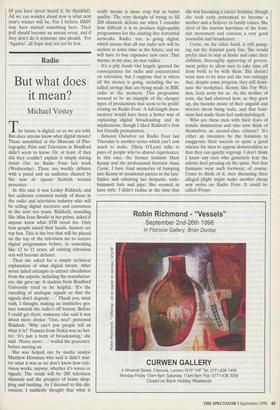Radio
But what does it mean?
Michael Vestey
The future is digital, or so we are told. But does anyone know what digital means? Those assembled at the Museum of Pho- tography, Film and Television in Bradford didn't seem to know. Or, at least, if they did they couldn't explain it simply during Inside Out on Radio Four last week (Wednesday). These are weekly debates with a panel and an audience chaired by the now de rigueur Scottish woman presenter.
In this case it was Lesley Riddoch, and her audience consisted mainly of those in the radio and television industry who will be selling digital receivers and converters in the next ten years. Riddoch, sounding like Miss Jean Brodie in her prime, asked if anyone knew what STB stood for. Only four people raised their hands. Answer: set top box. This is the box that will be placed on the top of the television set to receive digital programmes before, in something like 12 to 15 years, all existing television sets will become defunct.
Then she asked for a simple technical explanation of what digital meant. After seven failed attempts to extract elucidation from the experts, including the manufactur- ers, she gave up. A student from Bradford University tried to be helpful. 'It's the encoding of analogue signals so that the signals don't degrade ...' Thank you, must rush, I thought, making an instinctive ges- ture towards the radio's off button. Before I could get there, someone else said it was about more choice. `Ooo, noo!' protested Riddoch. 'Why can't you people tell us what it is?' Frances from Nokia was no bet- ter: 'It's just a form of broadcasting,' she said. `N000, n000 ...' wailed the presenter, before moving on.
She was helped out by media analyst Matthew Horsman who said it didn't mat- ter what it was as we don't know how tele- vision works, anyway, whether it's waves or signals. The result will be 200 television channels and the prospect of home shop- ping and banking. As I listened to this dis- cussion, I suddenly thought that what it really means is more crap but in better quality. The very thought of trying to fill 200 channels defeats me when I consider how difficult it is to produce high-quality programmes for the existing five terrestrial networks. Radio, too, is going digital, which means that all our radio sets will be useless at some time in the future, and we will have to buy expensive new ones. That means, in my case, six new radios.
It's a pity Inside Out largely ignored the consequences for radio and concentrated on television, but I suppose that is where all the money is going, including the so- called savings that are being made in BBC radio at the moment. This programme seemed to be an example of the cheaper types of productions that seem to be prolif- erating on Radio Four. A full-length docu- mentary would have been a better way of explaining digital broadcasting and its implications, though I liked Riddoch's firm but friendly presentation.
Between Ourselves on Radio Four last Thursday is another series which can't cost much to make. Olivia O'Leary talks to pairs of people who've shared experiences; in this case, the former feminist Mary Kenny and the professional feminist Anna Coote. I have fond memories of bumping into Kenny at occasional parties in the late- Sixties and admiring her hotpants, wide- brimmed hats and pipe. She seemed to have style. I didn't realise at the time that she was becoming a career feminist, though she took early retirement to become a mother and a believer in family values. She tired of the marxist harridans of the femi- nist movement and remains a very good journalist and broadcaster.
Coote, on the other hand, is still pump- ing out the feminist party line. She would prefer men to stay at home and raise their children, thoroughly approving of govern- ment policy to allow men to take time off from work to be with them. She doesn't want men to be men and she was unhappy that, despite some progress, they still domi- nate the workplace. Kenny, like Fay Wel- don, feels sorry for us. As the mother of sons, she had observed how, as they grew up, she became aware of their anguish and worries about being male, and that femi- nism had made them feel underprivileged.
Who are these men with their fears of female domination and who now think of themselves as second-class citizens? It's either an invention by the feminists to exaggerate their success or quite a good wheeze for men to appear downtrodden so that they can quietly regroup. I don't think I know any men who genuinely fear the stiletto heel pressing on the spine. Not that feminists wear such footwear, of course. Come to think of it, men discussing their alleged plight might make another cheap new series on Radio Four. It could be called Wimps.


























































 Previous page
Previous page